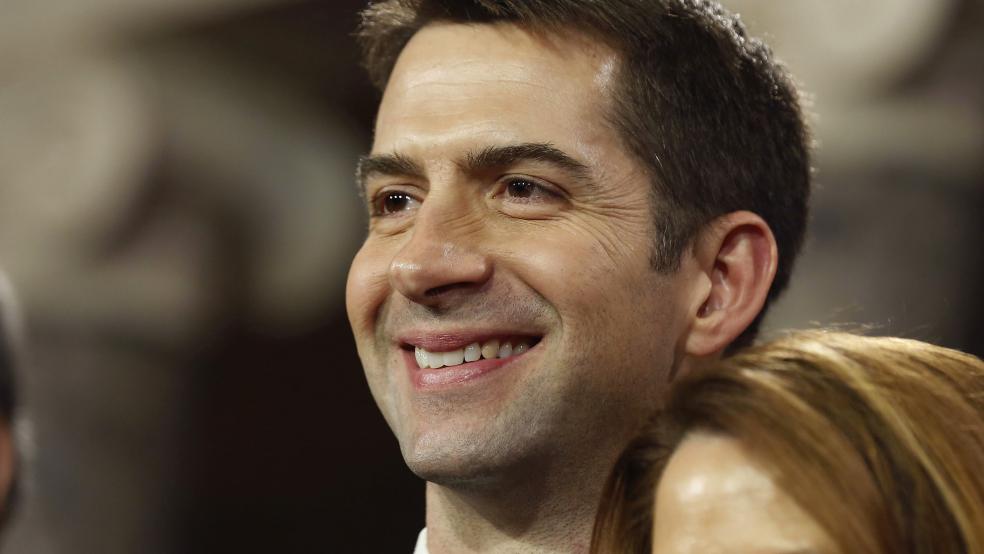Freshman United States senators are usually thrilled to get their name on a piece of legislation or to get assigned to a choice committee they can aspire to chair a decade later. Few, however, manage to manufacture a significant international incident within a few months of taking office.
Sen. Tom Cotton (R-AR) is the exception. The former House member, who was elected to the Senate last November, was the lead author of a controversial open letter to the leadership of Iran released yesterday. Signed by 47 GOP senators, including the entire Senate leadership team, the letter was presented as an offer to “educate” the Iranian leadership on the realities of American politics. It was widely seen as an effort to derail ongoing negotiations with the Islamic Republic over its nuclear program.
Related: GOP Senators Send Their Own Warning to Iran on Nukes
The letter warned Iran that the deal that the Obama administration — along with every other major world power — is negotiating now could well be overturned by the next president, unless Congress approves it.
Cotton’s letter provoked a harsh response from Tehran. Iranian Foreign Minister Javad Zarif said in a statement that the letter “has no legal value and is mostly a propaganda ploy.” He also said that Iran views the attempt of the Republican-led Senate to interfere in negotiations being conducted by the U.S. president as “unprecedented in diplomatic history.”
In all, a dubious achievement for Cotton, who is largely unknown on the national — much less international — stage.
Cotton brought a compelling personal story to the Senate with him. A graduate of Harvard and Harvard Law School, he left a private law practice and joined the Army after the 9/11 attacks. He served two combat tours in Iraq as an infantry officer, earning the Bronze Star. He also served a tour in Afghanistan with a provincial reconstruction team.
Related: Iran Pushed Back Against Senate GOP Leader
Cotton made the jump to the Senate after serving a single term in the House of Representatives. He is a strong Tea Party conservative who campaigned on security issues. In one memorable quote, he wrapped the GOP electorate’s concern with immigration, crime, and terrorism into a neat bundle: “Groups like the Islamic State collaborate with drug cartels in Mexico who have clearly shown they’re willing to expand outside the drug trade into human trafficking and potentially even terrorism. They could infiltrate our defenseless border and attack us right here in places like Arkansas.”
On Tuesday, he continued to defend his letter. In an interview with CNN, he denied that it was aimed at undermining the president. Cotton echoed Israeli Prime Minister Benjamin Netanyahu who, in a controversial address to a joint meeting of Congress, said the aim was to get a “better deal” than the one currently being discussed.
The current proposal to Iran is believed to offer a temporary lifting of economic sanctions in exchange for limits on the Iranian nuclear program and a vigorous inspections regime, with the gradual easing of restrictions over a period of ten or more years if Iran remains in compliance.
Related: A Nuclear Deal with Iran Starts to Look Likely
Cotton said that allowing Iran to maintain a nuclear enrichment program – which the government in Tehran says it wants for energy generation and the production of medical equipment – is tantamount to allowing the production of nuclear weapons themselves. The U.S., he said, needs to “stand strong, keep the credible use of force on the table and to drive a harder bargain.”
The letter to Iran, he said, was simply an example of Congress doing its constitutional duty to prevent “a single president committing the United States to a binding, lasting deal with the world’s leading sponsor of state terrorism to get nuclear weapons.” As Cotton himself pointed out in the letter, though, the deal being considered is neither “binding” nor “lasting” in any official sense.
It’s a point that has professional diplomats and legal experts particularly annoyed.
“Clearly the letter was an attempt to sabotage the negotiation. I don’t think there’s any doubt about that. It’s dripping with disingenuousness,” said Robert Einhorn, a former member of the team negotiating with Iran and a veteran of nearly three decades in the State Department.
Related: As Iran Talks Reach Key Stage, Obama Would Walk Away
“It was unnecessary in the sense that the Iranians do understand our constitutional system and they have expressed concerns about how [the agreement] will operate. The approach the administration is pursuing would involve, in the first instance, a temporary suspension of the sanctions using the president’s executive authority. Only years later would there be a removal of sanctions.”
Tehran is well aware that another administration in Washington could decide to treat the deal differently. “The uncertainty is built-in and it is unavoidable,” Einhorn said. “This is not something that the Republicans needed to teach the Iranians about.”
Despite that uncertainty, Tehran seems interested in moving forward, and Einhorn pointed to one likely reason for that: “The administration has told them that if an agreement is functioning effectively, then it is very likely that a successor administration of whatever party will leave well enough alone.”
Top Reads from The Fiscal Times:





